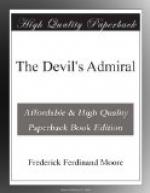But that was all past, and it did me no good to go over the mistakes I had made. I was bitter at myself for allowing Petrak to bring my bag on board, for I had thus given him an opportunity to claim me as an ally in the murder.
The best that I could make of the whole affair was that Meeker took me for a spy, as I had suspected from the first, and in order to prevent me from going to Hong-Kong for some purpose opposed to the plans of his masters, had done his best to keep me out of the steamer.
Then, when he found that he could not block me in going, he did the next best thing and came with me. To further embarrass me and prevent me from accomplishing the object of my supposed mission in Hong-Kong, he had got me involved in a crime from which I knew I would have a great deal of difficulty in getting myself free, especially as Petrak seemed willing enough to testify against me even though he should hang for the murder.
It seemed beyond reason that they should kill Trego simply to have something of which I might be accused; it seemed to me that my own death would have been an easier way to get rid of me.
I began an analysis of every event which entered into the total of the mystery, seeking for some key which would aid me in assorting the tangled bits that only needed to be arranged properly to bet the solution, much as a jig-saw puzzle is worked out. If I had a proper beginning it would all be easy enough.
The killing of the boatswain in the Flagship Bar seemed significant, although I could not connect it with Meeker’s plot against me, and I had to lay that episode aside until I saw it in its proper relation to the other parts.
Standing near the lamp, I wrote down on a scrap of paper each event in its proper order, from my first sight of Meeker that morning as I arrived at the mole from Saigon. When I had made a note of the delivery of the letter to the Russian consul at the bank, I found Trego and Meeker together—the spy disguised as a missionary seeking alms, and Trego driving him out of the room.
It was obvious enough to me that in delivering the letter I had walked into some sort of a plot of which I had no knowledge, for Meeker was not only spying upon me, but he was spying upon Trego or the bank.
The next time that Trego entered the list was when I was introduced to him in the bank, of little importance in itself, but worth a great deal when connected with the fact that Trego left Manila in the Kut Sang and in charge of the ship, to the amazement of even Captain Riggs.
“Trego killed.” As I put that down it flashed upon me that he had been struck down before he had told Captain Riggs why he had papers as supercargo—and a few minutes after he had shown that he was suspicious of Meeker!
I was baffled and realized that it was a waste of effort to attempt to theorize about the snarled web in which I found myself enmeshed. One thing was apparent enough, and that was Meeker did his best to keep me out of the Kut Sang, as he said, and I reached the conclusion that it was not me so much as the steamer which concerned him when he sought to divert my path from the vessel. If I had taken his broad hints in Manila I would have cancelled my ticket and probably never seen him again.




